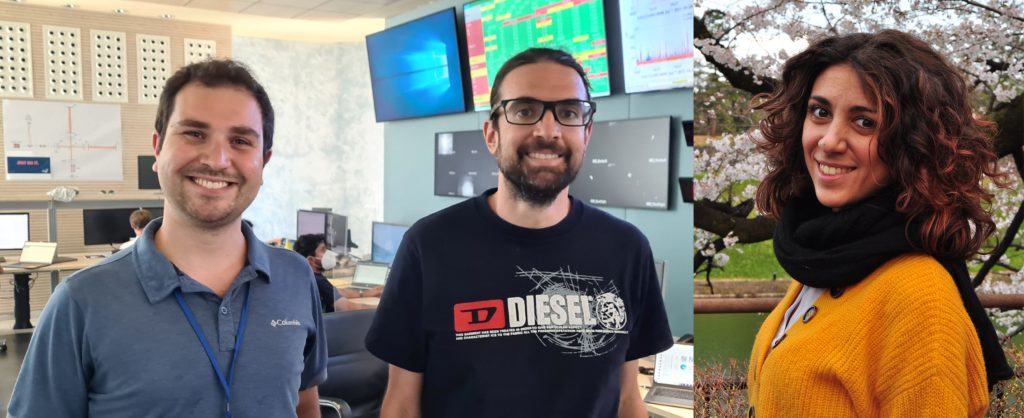Francesco di Renzo, Eleonora Polini and Marco Vardaro won the Virgo Award 2022

Young researchers Francesco di Renzo, University of Pisa and INFN Pisa, Eleonora Polini, LAPP/IN2P3/CNRS, and Marco Vardaro, University of Amsterdam and Nikhef, are the winners of the second edition of the Virgo Award, given by the international Virgo collaboration, every year, to young scientists of the collaboration, for their significant contribution to the operation of the experiment and to the results of the Virgo collaboration.
In particular, the Virgo Award 2022 was awarded, according to the jury’s motivation, to Francesco di Renzo “for strong commitments to detector characterization and noise hunting”, to Eleonora Polini “for sustained contributions to optical benches and squeezing activities” and to Marco Vardaro “for successful implementation of frequency dependent squeezing and commissioning activities”.
Three brilliant physicists who, despite their young age, have already made significant contributions to the experiment – said Giovanni Losurdo, Virgo spokesperson and researcher at the Italian National Institute of Nuclear Physics – working on crucial aspects to improve the performance of the detector in view of the restart of data taking in spring 2023. The Virgo Award is an important moment to recognise the work of young scientists, who are not always in the spotlight.
The award ceremony took place today at the European Gravitational Observatory in Cascina, Italy, during the Virgo Week, a quarterly meeting of the entire international collaboration held this week.
“I dedicate this award to all the awesome colleagues, in particular the younger ones, that I’ve had the pleasure to meet within the Virgo collaboration”, said Francesco di Renzo, “I am thankful to the award committee, and consider this prize besides a recognition a commitment from my side to do more and do better in sight of the next observing run.”
“It is an honour for me and also a great surprise to receive this award,” said Eleonora Polini. “I am delighted that my work is recognised by the Virgo collaboration, which in many ways has become like a family to me over the years of my PhD. The excitement over the results we achieved during commissioning has always repaid the hard work I put into the detector.”
“For me it is a great honour to have received this award – said Marco Vardaro – I’ve been a member of the Virgo collaboration since 2014 and in the last 4 years I worked on the operation of the Virgo experiment. I thank all the people who have believed in me and who have guided me during this period in which I have learned many things and grown both scientifically and as a person.”
The jury that selected the winners is made up of leading scientists in the field of gravitational wave physics: Lisa Barsotti (MIT Kavli Institute – LIGO), Monica Colpi (University of Milano Bicocca and INFN), Gabriela Gonzalez (Louisiana State University), Frank Linde (Netherlands Institute of Subatomic Physics – Nikhef ), Catherine Nary Man (Centre national de la recherche scientifique – CNRS) and Andrea Vicerè (University of Urbino).
The Virgo Collaboration currently consists of around 700 members from 129 institutions in 16 different (mainly European) countries. The European Gravitational Observatory (EGO) hosts the Virgo detector near Pisa in Italy, and is funded by the Centre National de la Recherche Scientifique (CNRS) in France, the Istituto Nazionale di Fisica Nucleare (INFN) in Italy, and the National Institute of Subatomic Physics (Nikhef) in the Netherlands. A list of the groups in the Virgo collaboration can be found at http://public.virgo-gw.eu/the-virgo-collaboration/. Further information is available on the Virgo website at http://www.virgo-gw.eu.
Awardees Bio:
Francesco Di Renzo is a postdoctoral researcher at the Physics Department of the University of Pisa and a member of the Virgo Collaboration. He is active in the study of noise and the characterization of the Virgo detector, in order to improve its sensitivity to astrophysical signals.
Eleonora Polini studied physics at La Sapienza University in Rome, and completed her Master’s degree in Florida and Japan, doing experimental research in gravitational wave physics. She is currently finishing her PhD in Physics in France where she had the opportunity to work on the Virgo experiment, in particular on the commissioning of both the detection system and the new quantum noise reduction technique. Her main research interest is quantum optics applied to the enhancement of gravitational wave detectors.
Marco Vardaro graduated from the University of Trento in 2014. In the same year, he started his PhD at the University of Padua and became a member of the Virgo collaboration. Since 2019 he has been a postdoc at the University of Amsterdam, and since 2020 he has moved back to the Virgo site to participate in the installation and commissioning of the experiment for the fourth observation run (O4). During this time he worked on both the control of the interferometer and the decrease of high-frequency quantum noise by injecting special light states called squeezed states.
Pictured from left to right Francesco di Renzo, Marco Vardaro and Eleonora Polini